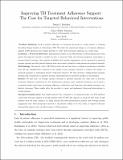Improving Tuberculosis Treatment Adherence Support: The Case for Targeted Behavioral Interventions
Author(s)
Boutilier, Justin J; Jónasson, Jónas Oddur; Yoeli, Erez
DownloadAccepted version (2.926Mb)
Open Access Policy
Open Access Policy
Creative Commons Attribution-Noncommercial-Share Alike
Terms of use
Metadata
Show full item recordAbstract
<jats:p> Problem definition: Lack of patient adherence to treatment protocols is a main barrier to reducing the global disease burden of tuberculosis (TB). We study the operational design of a treatment adherence support (TAS) platform that requires patients to verify their treatment adherence on a daily basis. Academic/practical relevance: Experimental results on the effectiveness of TAS programs have been mixed; and rigorous research is needed on how to structure these motivational programs, particularly in resource-limited settings. Our analysis establishes that patient engagement can be increased by personal sponsor outreach and that patient behavior data can be used to identify at-risk patients for targeted outreach. Methodology: We partner with a TB TAS provider and use data from a completed randomized controlled trial. We use administrative variation in the timing of peer sponsor outreach to evaluate the impact of personal messages on subsequent patient verification behavior. We then develop a rolling-horizon machine learning (ML) framework to generate dynamic risk predictions for patients enrolled on the platform. Results: We find that, on average, sponsor outreach to patients increases the odds ratio of next-day treatment adherence verification by 35%. Furthermore, patients’ prior verification behavior can be used to accurately predict short-term (treatment adherence verification) and long-term (successful treatment completion) outcomes. These results allow the provider to target and implement behavioral interventions to at-risk patients. Managerial implications: Our results indicate that, compared with a benchmark policy, the TAS platform could reach the same number of at-risk patients with 6%–40% less capacity, or reach 2%–20% more at-risk patients with the same capacity, by using various ML-based prioritization policies that leverage patient engagement data. Personal sponsor outreach to all patients is likely to be very costly, so targeted TAS may substantially improve the cost-effectiveness of TAS programs. </jats:p>
Date issued
2021Department
Sloan School of ManagementJournal
Manufacturing and Service Operations Management
Publisher
Institute for Operations Research and the Management Sciences (INFORMS)
Citation
Boutilier, Justin J, Jónasson, Jónas Oddur and Yoeli, Erez. 2021. "Improving Tuberculosis Treatment Adherence Support: The Case for Targeted Behavioral Interventions." Manufacturing and Service Operations Management.
Version: Author's final manuscript